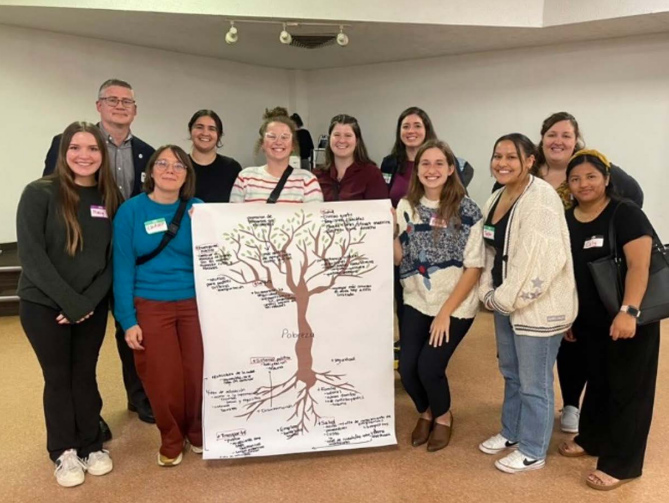UNO Researchers Advance Omaha’s First-Ever Poverty Elimination Plan
Backed by new legislation and community voices, the Omaha City Council recently adopted a groundbreaking action plan drafted by UNO experts.
- published: 2025/08/26
- contact: Sam Peshek - Office of Strategic Marketing and Communications
- email: unonews@unomaha.edu

➡️ What’s new: The Omaha City Council has adopted a comprehensive Poverty Elimination Action Plan (PEAP) crafted by faculty at the University of Nebraska at Omaha (UNO) Nebraska Center for Justice Research (CJR) and Grace Abbott School of Social Work.
- The plan, mandated by Nebraska’s LB 840 legislation, positions Omaha to address poverty with targeted, data-backed strategies with a distinctly local touch.
- Read the full plan and Omaha City Council resolution.
- The research team partnered closely with city leaders, nonprofits, and residents to identify systemic gaps.
- Together, they outlined community-informed, research-based recommendations that prioritize housing, transportation, education, health, and jobs.
📊 By the numbers: Key findings from the report include:
- Homeownership costs in Omaha surpass the national median of $1,331, whereas rental costs are lower than the U.S. median of $1,348.
- 9.7% of Omaha residents are uninsured, higher than the national average (8.6%), with a notable percentage from lower-income groups.
- Nebraska’s Aid to Dependent Children (ADC) program is underutilized, with 90% of applications denied, leading to $126 million in unspent federal funds.
👍 Proposed solutions: The research team identified several recommendations to address each of the key components of poverty:
- Housing: Expand subsidies, improve tenant protections, invest in affordable housing, and support tools like tax increment financing (TIF), land banks, and tax credits to grow and preserve housing stock.
- Economic supports: Introduce a guaranteed income pilot, expand paid leave, subsidize childcare, and create a local Earned Income Tax Credit (EITC).
- Education: Increase access to early childhood education, support Omaha Public Schools, and offer job training through business-education partnerships and financial aid.
- Transportation: Make microtransit permanent if the pilot proves popular and cost-effective, enhance ORBT and public transit access, and align development with transportation needs, especially for students and job seekers.
- Employment: Expand childcare assistance, raise the minimum wage, support small businesses, and consider public-private partnerships.
- Health access: Strengthen community health and mental health services and create a medical liaison program to reduce financial barriers to care.
🔁 Built to last: The research team didn’t stop at proposing solutions. They also created an implementation matrix to sustain the plan:
- Integrated Implementation: Align poverty reduction efforts with existing city systems, policies, and planning frameworks to ensure long-term adoption—not just short-term projects.
- Diversified Funding: Use a mix of local, state, federal, philanthropic, and private-sector funding to reduce reliance on any single source and ensure financial stability.
- Community and Stakeholder Engagement: Establish structures like a Mayor’s Advisory Task Force and host regular public meetings to ensure continued input from residents, nonprofits, and business partners.
- Data Monitoring and Evaluation: Develop shared metrics to track progress and guide real-time adjustments. Use centralized data systems and annual evaluations to ensure accountability and transparency.
- Policy and System Change: Advocate for local and state legislation that supports the plan’s goals (e.g., housing policy, transportation funding), embedding anti-poverty strategies into long-term civic priorities.
- Public Awareness & Communication: Maintain visibility through ongoing storytelling, updates, and public reporting to keep the public engaged and informed.
- Flexibility and Innovation: Adapt to emerging needs and new research findings by staying open to experimentation and continuous improvement.
🎤 What they’re saying:
- Ryan Spohn, Ph.D., Director, UNO Nebraska Center for Justice Research: “The fact that both the Nebraska Legislature and the City of Omaha entrusted our team with this work speaks volumes. It’s a testament to the value of the Nebraska Center for Justice Research and to the dedication of the faculty, staff, and students who poured their time, talent, and expertise into this plan.”
- Katelynn Towne, Ph.D., Research Coordinator, UNO Nebraska Center for Justice Research: “One of the most valuable aspects of the plan is how it integrates community input with evidence-based policy recommendations. I’m deeply appreciative of the policymakers and city staff who laid the groundwork for this effort, and I’m optimistic about how our city will build from this blueprint.”
- Laurel Sariscsany, Ph.D., Assistant Professor, UNO Grace Abbott School of Social Work: “Poverty isn’t just a personal issue. It affects our entire city in ways that we might not always see. It’s inspiring to see Omaha and the state taking poverty seriously and committing to a plan that reflects the voices, needs, and ideas of the people who live here.”
⚡ What’s next: The City will begin implementing the plan through a Mayor’s Advisory Task Force and continue partnering with UNO on progress tracking, policy design, and community engagement.
About the University of Nebraska at Omaha
Located in one of America’s best cities to live, work and learn, the University of Nebraska at Omaha (UNO) is Nebraska’s premier metropolitan university. With more than 15,000 students enrolled in 200-plus programs of study, UNO is recognized nationally for its online education, graduate education, military friendliness and community engagement efforts. Founded in 1908, UNO has served learners of all backgrounds for more than 100 years and is dedicated to another century of excellence both in the classroom and in the community.
Follow UNO on Facebook, Twitter (X), Instagram, LinkedIn, and YouTube.